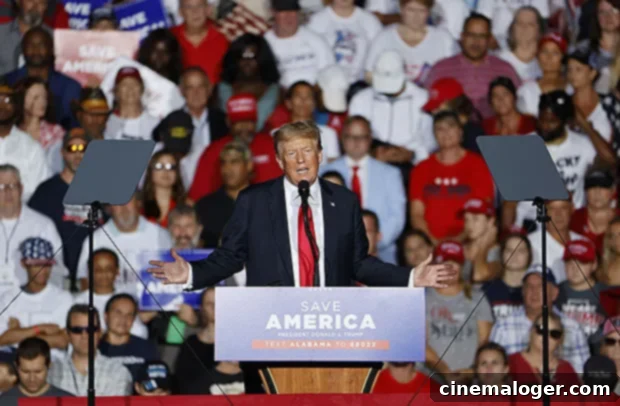Stephanie Grisham’s Memoir: Unveiling Donald Trump’s White House Conduct and Inappropriate Behavior
Former White House official Stephanie Grisham offers a candid and often unsettling look behind the gilded doors of the Trump administration in her highly anticipated memoir, I’ll Take Your Questions Now: What I Saw in the Trump White House. Released on October 5, Grisham’s account provides an insider’s perspective on her multifaceted roles as Press Secretary to Donald Trump and later as Chief of Staff to former First Lady Melania Trump. The book has quickly garnered attention for its unflinching revelations, particularly those detailing what Grisham describes as President Trump’s inappropriate behavior towards female staffers, including a notably awkward exchange involving her own boyfriend.

An Unvarnished Look Inside the Trump White House
Grisham, 45, occupied a unique position within the Trump orbit, serving as one of the few individuals who transitioned between the West Wing and the East Wing, gaining insights into both the president’s inner circle and the dynamics surrounding the First Lady. Her memoir promises to be a significant addition to the growing collection of tell-all books from former Trump officials, distinguishing itself through its focus on the human element and the daily interactions that defined the administration. Rather than a policy-focused analysis, Grisham’s book delves into the personal conduct, the power struggles, and the often-chaotic atmosphere she observed firsthand. Her experiences, spanning from her initial role in the campaign to her final days as a top aide, provide a comprehensive timeline of events and a rare glimpse into the President’s character and decision-making processes.
The title itself, I’ll Take Your Questions Now, carries a layer of irony, given Grisham’s tenure as Press Secretary was famously marked by a distinct lack of traditional press briefings. This deliberate choice hints at her intention to finally provide answers to the questions that lingered throughout her time in the administration, offering transparency where there was once opacity. Her account is presented in a straightforward, accessible style, aiming to convey her experiences and observations without overly complex political jargon, making it resonate with a broad readership interested in the inner workings of presidential power and the ethical challenges faced by those in service to it.
The “Boys Will Be Boys” Chapter: Gossip and Personal Boundaries
One of the most revealing sections of Grisham’s memoir is the chapter titled “Boys Will Be Boys,” where she pulls back the curtain on the prevalence of gossip and personal inquiry within the White House under President Trump. According to Grisham, President Trump had an insatiable appetite for office chatter, describing him as someone who “loved gossip more than anyone in the White House.” This environment, where personal lives were often topics of discussion among staff and, remarkably, even by the President himself, set the stage for uncomfortable and boundary-crossing interactions, fostering a climate where professional distance was frequently blurred.
Grisham recounts how her personal life became a subject of particular interest to the President when she began dating her boyfriend. She notes that Trump would frequently ask about the status of their relationship, often commenting on what a “good-looking couple” they made. While seemingly innocuous on the surface, these questions soon escalated into a far more intrusive line of questioning, underscoring a pattern of behavior that crossed professional boundaries and created an uncomfortable atmosphere for staff members. The constant focus on her private life from the most powerful man in the country highlighted a perceived lack of respect for personal space and privacy within the administration’s inner circle.
A Disconcerting Exchange on Air Force One
The memoir details a specific incident that exemplifies the extent of this boundary-crossing. Grisham reveals that her boyfriend, during a flight on Air Force One, was subjected to a deeply personal and inappropriate question from President Trump. As they were reportedly listening to music together, Trump abruptly asked Grisham’s partner if she was “good in bed.” This anecdote, delivered directly from her boyfriend, serves as a stark illustration of the former president’s willingness to delve into the most intimate aspects of his subordinates’ lives, blurring the lines between professional decorum and personal invasiveness.
This incident is not presented as an isolated event but rather as part of a broader pattern of Trump’s interactions with female staffers. Grisham elaborates that the question left both her and her boyfriend taken aback, highlighting the immense power imbalance inherent in such an exchange. For a president to ask such a question of an aide’s partner is not only unprofessional but also raises serious concerns about the respect afforded to individuals within his employ. It fostered an environment where personal boundaries were consistently tested, creating a climate of unease among those working closely with the President and prompting questions about the ethical standards upheld in the highest office.

Observed Interest in a Young Female Staffer
Beyond the personal anecdote involving her boyfriend, Grisham also recounts her observations of President Trump’s “unusual interest” in a particular young, highly attractive press wrangler on her team during her time as Press Secretary. While she explicitly states that she is not alleging that “anything happened between the president and the woman,” she firmly asserts that “he behaved inappropriately.” This distinction is crucial, as Grisham’s account focuses on the observable behavior and its impact, rather than relying on speculation or unsubstantiated claims, providing a factual basis for her concerns.
The former Press Secretary details how Trump’s interest manifested. He would frequently inquire about the staffer’s whereabouts if she wasn’t visible with the press corps. His questions extended to whether she would be accompanying the delegation on foreign trips. When she did travel, Grisham notes that Trump would often specifically request that she bring the young woman to his private office cabin on the aircraft – a request he rarely made of anyone else, according to her observations. Grisham describes these instances collectively, stating that the “whole thing never felt quite right.” This ongoing pattern of singular attention from the President to a junior staffer created an atmosphere of discomfort and concern among those who witnessed it, raising questions about professional boundaries, potential favoritism, and appropriate conduct in the highest office.
Beyond the Allegations: The “Clown Car on Fire” White House
Grisham’s memoir extends far beyond these personal anecdotes, painting a broader picture of a chaotic and often dysfunctional White House. Her memorable description of the Trump administration as a “clown car on fire running at full speed into a warehouse of fireworks” encapsulates the tumultuous environment she witnessed daily. This vivid analogy speaks volumes about the perceived instability, the lack of control, and the constant potential for explosive situations that characterized the presidency. It suggests a constant state of crisis management, where dramatic events were not just occasional but a consistent feature of the administration’s operations.
The book also delves into the complex dynamics within the First Family, including former First Lady Melania Trump’s reported frustrations with stepdaughter Ivanka Trump. Grisham reveals that Melania often referred to Ivanka as “The Princess,” a nickname that subtly conveys a sense of perceived entitlement or special treatment, and perhaps underlying tension. These details offer a rare glimpse into the personal relationships and underlying frictions that existed within the family, shaping the interactions and decisions made at the highest levels of government and impacting the overall White House atmosphere.
Furthermore, Grisham touches upon President Trump’s “terrifying” temper, describing how his unpredictable outbursts affected staff morale and the efficiency of the administration. She illustrates how such a volatile temperament could create an environment of fear and uncertainty, where aides were constantly walking on eggshells, impacting their ability to perform their duties effectively and leading to a climate of apprehension. These observations collectively contribute to a portrait of a White House where personal drama and unpredictable behavior often overshadowed official responsibilities, influencing policy and public perception alike.
Trump’s Rebuttal: Dismissal and Counter-Accusations
Predictably, President Trump has vehemently pushed back against Grisham’s memoir, dismissing its contents as “untrue” and attacking Grisham’s character. In a statement released shortly after the book’s revelations began to surface, Trump characterized his former aide as “angry and bitter.” His response aligns with a well-established pattern of discrediting former associates who publish critical accounts of his presidency, often attributing their motives to personal grievances or financial gain, thereby attempting to undermine the credibility of their claims.
Trump’s statement read, in part: “Stephanie didn’t have what it takes and that was obvious from the beginning. She became very angry and bitter after her break up and as time went on she was seldom relied upon, or even thought about. She had big problems and we felt that she should work out those problems for herself. Now, like everyone else, she gets paid by a radical left-leaning publisher to say bad and untrue things.” This highly critical counter-narrative attempts to undermine Grisham’s credibility by questioning her competence, personal stability, and motivations, framing her work as a politically motivated attack rather than a factual recollection, a tactic often employed to deflect criticism.
The clash between Grisham’s detailed accounts and Trump’s categorical denials highlights a recurring theme of his post-presidency. By labeling critical voices as “angry,” “bitter,” or “radical left-leaning,” Trump seeks to delegitimize their narratives and rally his base against perceived enemies, a strategy that plays into existing political divisions. However, for many readers, Grisham’s insights, particularly those concerning the inner workings and personal conduct, offer valuable context to an administration that frequently defied traditional norms and expectations, presenting a nuanced view of the challenges faced by those serving within it.
The Enduring Impact of Insider Accounts
Stephanie Grisham’s I’ll Take Your Questions Now stands as another significant insider account from the Trump White House, contributing to the historical record and offering profound insights into a presidency marked by unprecedented events and unconventional leadership. Memoirs like Grisham’s play a crucial role in shaping public perception and understanding of historical moments, providing first-hand testimonies that often challenge official narratives and spark broader discussions about accountability and transparency in government.
Her willingness to detail uncomfortable truths, from the inappropriate questions to the chaotic atmosphere, underscores the courage required for former officials to come forward, often at personal and professional risk. While controversial and met with strong rebuttals, these accounts are vital for democratic accountability and informed public discourse, serving as checks on power and influence. Grisham’s memoir forces a re-examination of ethical conduct, professional boundaries, and the culture within the highest echelons of government, ensuring that the legacy of the Trump administration is viewed through a multifaceted lens, incorporating both policy decisions and the personal interactions that colored its tenure.
